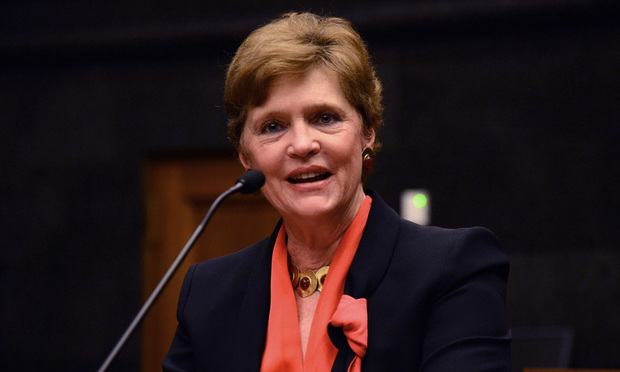SDNY Courthouse Restricts Visitors, 2 Manhattan Family Courtrooms Close, in Responses to Coronavirus
District Executive Edward Friedland said the measures had not significantly impacted the number of people reporting for jury duty. However, if the threat continued to rise, officials could be forced to delay upcoming trials.
March 09, 2020 at 01:49 PM
7 minute read
The original version of this story was published on New York Law Journal
 U.S. District Chief Judge Colleen McMahon of the Southern District of New York.
U.S. District Chief Judge Colleen McMahon of the Southern District of New York.
U.S. District Chief Judge Colleen McMahon of the Southern District of New York issued a standing order Monday morning that barred people who had visited five countries particularly hard-hit by the coronavirus outbreak in the last 14 days from entering court premises.
The directive, which cited Italy, China, South Korea, Japan and Iran, also blocked entry to anyone who had come into close contact with people who had returned from the countries in the last two weeks and would remain in effect until further notice, a court spokesman confirmed.
Federal court officials in Manhattan are also denying entry to anyone who had been recently diagnosed with COVID-19 or shared close quarters with those who had.
Potential jurors were being instructed to follow the same protocols, and adjournments would be granted for anyone who was sick, elderly or had a compromised immune system, said district executive Edward Friedland.
As of Monday morning, Friedland said, the measures had not significantly impacted the number of people reporting for jury duty. However, if the threat continued to rise, officials could be forced to delay upcoming trials, Friedland said.
In the event of a juror shortage, criminal trials would take priority over civil matters.
The U.S. District Court for the Eastern District of New York had yet to issue public guidance on coronavirus Monday, and Chief Judge Roslynn Mauskopf did not immediately respond to a question about the situation.
The U.S. Court of Appeals for the Second Circuit announced late Monday that it would continue hearing appeals as usual this week, but would observe the same restrictions for lawyers and pro se parties.
The Metropolitan Correctional Center, the federal jail abutting the Southern District courthouse in lower Manhattan, had begun voluntarily testing the body temperatures of detainees before they were allowed to report to court. The Metropolitan Detention Center in Brooklyn was taking similar precautions, Friedland said.
David Patton, executive director of the Federal Defenders of New York, said his organization had been working with representatives from the courts, the U.S. attorney's office and pretrial services to discuss contingency planning.
MCC on Monday continued to be on "90% lockdown" after a gun had been smuggled into the facility, and lawyers continued to have limited access to clients, Patton said. So far, the Federal Defenders had not received any guidance from prison officials regarding policies and procedures for dealing with the coronavirus.
Of particular concern, he said, was the impact that emergency measures could have on defendants who were detained pending trial or sentencing.
"It's no solution just to delay [trials]. For some people who were being held pending trial or sentencing, they want to proceed with their cases," he said. "We're going to be as flexible as we can be for people who are not detained and are OK with delaying their proceedings."
Guiding the federal courts in New York state would be a COVID-19 task force organized by the Administrative Office of the U.S. Courts to serve as a "single point of contact within the judiciary" to share information and guidance to the courts.
"In addition, individual courts are coordinating with state and local health officials to obtain current local information, and the AO is providing them with guidance on human resources, budget, and other operational issues, as well as continual updates from the [Centers for Disease Control and Prevention]," the AO said in a statement.
The AO, earlier this month, had also provided courts with a "model pandemic/infectious disease plan" to aid in emergency planning and "continuity of operations" protocols.
New York state courts also introduced measures to protect users of courtrooms.
All cases were administratively adjourned as of Monday in Manhattan Family Court's parts 45 and 46 after an intern was admitted to a Westchester hospital with pneumonia, state court system spokesman Lucian Chalfen said.
The intern, who attends New York Law School, has been tested for coronavirus but the results have not come back yet, Chalfen said. The courtrooms and robing rooms are being thoroughly disinfected while they're closed, Chalfen said.
Chalfen said he was not aware of any other court closures in New York City or Westchester County related to coronavirus. The state court system has a coronavirus task force that meets daily, according to a memo sent to all state court employees March 6.
While public access to the state's courthouses has not yet been restricted, the state court system is "in the process of reviewing and strengthening [its] capacity for remote court appearances," according to the memo.
"We already have remote capabilities in many courthouses, but depending on how the situation continues to evolve, other than arraignments, matters could be adjourned," Chalfen said Monday.
The employee memo also said all coronavirus contact, "no matter how remote," should be reported to uniformed security officers.
State court system employees are allowed to take paid time off for coronavirus without depleting their existing sick leave, whether they are diagnosed with the virus or are quarantined or self-monitoring at home, Chalfen confirmed.
The New York State Commissioner of Jurors has asked jurors and potential jurors to avoid courthouses if they were diagnosed with coronavirus, suffered from flu symptoms or were instructed to self-monitor for coronavirus by their employer or medical personnel. Jurors in those situations should contact their county courts to postpone jury service "until this health emergency has passed," according to a memo issued March 5.
As of midday Monday, the Manhattan District Attorney's Office had not encountered case delays due to coronavirus, a spokesman said.
There are now 142 total confirmed cases of coronavirus across New York state, Gov. Andrew Cuomo announced Monday. More than three dozen of those cases are new, according to Cuomo.
The center of the state's outbreak remains Westchester County, a northern suburb of New York City that holds a total of 98 cases.
New York City has 19 cases, while Nassau County on Long Island had 17, according to the governor's office. Officials have not tied any New York death to the coronavirus.
Aiming to blunt the spread of a virus that has spiked public anxiety, Cuomo rolled out a new line of state-created hand sanitizer expected to be provided to state agencies and high-risk communities. The product would be produced by state prison inmates, Cuomo said.
The governor's office reports that New York will be able to make up to 100,000 gallons of hand sanitizer per week.
The Legal Aid Society objected to the fact that the manufacturing of sanitizer would be performed by inmates in state correctional facilities.
"Albany must pay these individuals the minimum wage and lawmakers must legislate to eradicate forced labor across our state for good," the group said in a statement after Cuomo's announcement.
Cuomo has repeatedly sought to quell public fear and said Monday that only a limited number of people are hospitalized in New York due to the virus.
READ MORE:
As Coronavirus Spreads, Legal Industry Shifts into Crisis Management Mode
This content has been archived. It is available through our partners, LexisNexis® and Bloomberg Law.
To view this content, please continue to their sites.
Not a Lexis Subscriber?
Subscribe Now
Not a Bloomberg Law Subscriber?
Subscribe Now
NOT FOR REPRINT
© 2025 ALM Global, LLC, All Rights Reserved. Request academic re-use from www.copyright.com. All other uses, submit a request to [email protected]. For more information visit Asset & Logo Licensing.
You Might Like
View All


Federal Judge Pauses Trump Funding Freeze as Democratic AGs Plan Suit
4 minute read
Former U.S. Dept. of Education Attorney Suspended for Failure to Complete CLE Credits
3 minute readTrending Stories
Who Got The Work
J. Brugh Lower of Gibbons has entered an appearance for industrial equipment supplier Devco Corporation in a pending trademark infringement lawsuit. The suit, accusing the defendant of selling knock-off Graco products, was filed Dec. 18 in New Jersey District Court by Rivkin Radler on behalf of Graco Inc. and Graco Minnesota. The case, assigned to U.S. District Judge Zahid N. Quraishi, is 3:24-cv-11294, Graco Inc. et al v. Devco Corporation.
Who Got The Work
Rebecca Maller-Stein and Kent A. Yalowitz of Arnold & Porter Kaye Scholer have entered their appearances for Hanaco Venture Capital and its executives, Lior Prosor and David Frankel, in a pending securities lawsuit. The action, filed on Dec. 24 in New York Southern District Court by Zell, Aron & Co. on behalf of Goldeneye Advisors, accuses the defendants of negligently and fraudulently managing the plaintiff's $1 million investment. The case, assigned to U.S. District Judge Vernon S. Broderick, is 1:24-cv-09918, Goldeneye Advisors, LLC v. Hanaco Venture Capital, Ltd. et al.
Who Got The Work
Attorneys from A&O Shearman has stepped in as defense counsel for Toronto-Dominion Bank and other defendants in a pending securities class action. The suit, filed Dec. 11 in New York Southern District Court by Bleichmar Fonti & Auld, accuses the defendants of concealing the bank's 'pervasive' deficiencies in regards to its compliance with the Bank Secrecy Act and the quality of its anti-money laundering controls. The case, assigned to U.S. District Judge Arun Subramanian, is 1:24-cv-09445, Gonzalez v. The Toronto-Dominion Bank et al.
Who Got The Work
Crown Castle International, a Pennsylvania company providing shared communications infrastructure, has turned to Luke D. Wolf of Gordon Rees Scully Mansukhani to fend off a pending breach-of-contract lawsuit. The court action, filed Nov. 25 in Michigan Eastern District Court by Hooper Hathaway PC on behalf of The Town Residences LLC, accuses Crown Castle of failing to transfer approximately $30,000 in utility payments from T-Mobile in breach of a roof-top lease and assignment agreement. The case, assigned to U.S. District Judge Susan K. Declercq, is 2:24-cv-13131, The Town Residences LLC v. T-Mobile US, Inc. et al.
Who Got The Work
Wilfred P. Coronato and Daniel M. Schwartz of McCarter & English have stepped in as defense counsel to Electrolux Home Products Inc. in a pending product liability lawsuit. The court action, filed Nov. 26 in New York Eastern District Court by Poulos Lopiccolo PC and Nagel Rice LLP on behalf of David Stern, alleges that the defendant's refrigerators’ drawers and shelving repeatedly break and fall apart within months after purchase. The case, assigned to U.S. District Judge Joan M. Azrack, is 2:24-cv-08204, Stern v. Electrolux Home Products, Inc.
Featured Firms
Law Offices of Gary Martin Hays & Associates, P.C.
(470) 294-1674
Law Offices of Mark E. Salomone
(857) 444-6468
Smith & Hassler
(713) 739-1250








